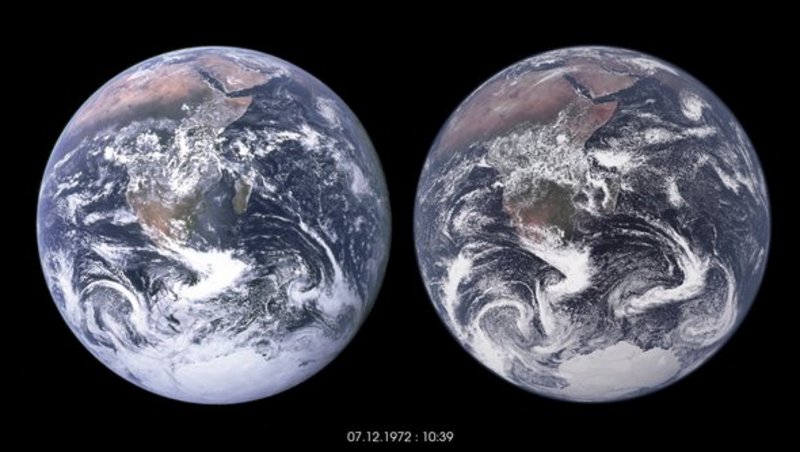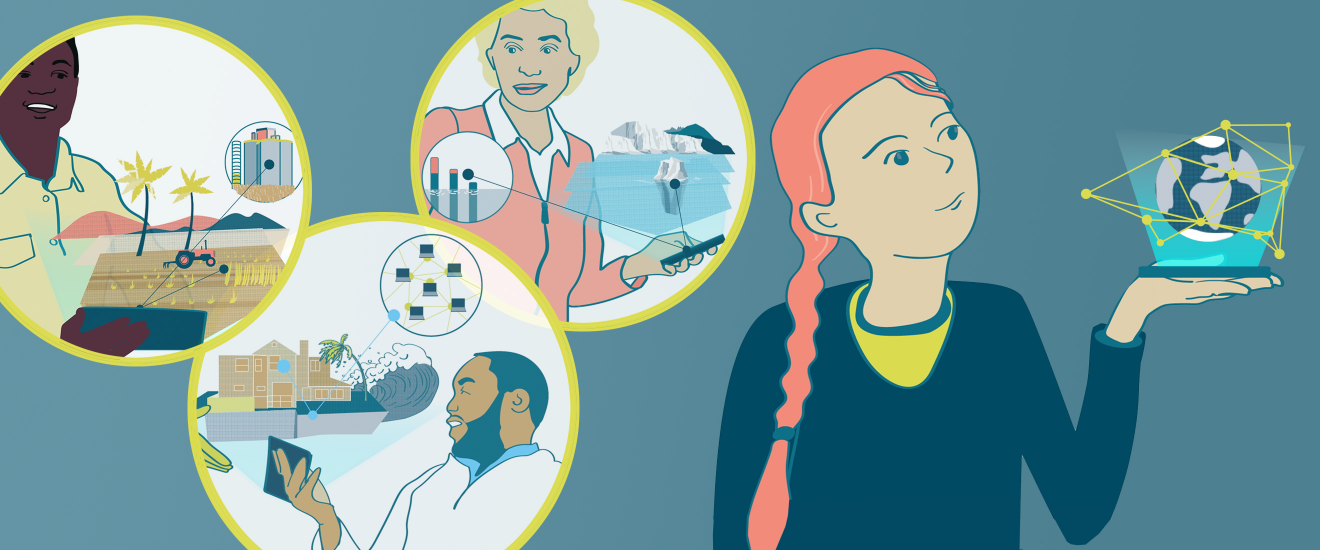The Berlin Summit for EVE: Toward closing the climate information gap
However, the consequences of the human-induced warming on humanity and the Earth system are still largely unknown. This knowledge gap hinders adaptation and risk assessment. Confronted with this knowledge gap, some countries are beginning to run and compare global climate scenarios drawing from scores of traditional global climate models, to produce legions of simulations to better identify signals of change. Others are working to develop a new generation of computationally intensive models, in the expectation that their enhanced physical content can beat back systematic biases and better represent the local granularity of global weather and climate. Yet others, including a growing number of privately funded initiatives, are exploring the capabilities of Artificial Intelligence (AI) to better compensate for biases of existing models, or even provide purely empirically based assessments of future hazards. These activities, as laudable as each may be on its own terms, are mostly distributed as blue-sky research efforts across a large number of research laboratories, or private companies. They are accompanied by high levels of redundancy, leading to siloed workflows and a lack of standardization, and most crucially, spread precious talent thinly. The problem is simply too important, too urgent, and too challenging not to be approached together.
The sense that we are better together is the underlying impetus to develop EVE, Earth Virtualization Engines. EVE builds on this impetus to identify the information needs arising from the imperative to sustainably and equitably manage our planet, and the opportunities available to address these needs. Invited guests from all around the world are gathering for the Berlin Summit (3 to 7 July, 2023) to develop a vision or blueprint for EVE, as a coordinated global effort to tap into the potential of technology and human ingenuity to best meet the challenges identified and those yet to come.
Urgent need for innovative collaboration strategies to address global warming challenges
There is no doubt that the warming of the Earth is a result of human activity. While previous generations of models and international assessments were fundamental in helping us comprehend this truth, a new class of models, along with more dynamic means of disseminating knowledge, are urgently required to guide efforts to prepare for the effects of global warming. Further warming and its cumulative effects are unavoidable, even if we are successful in quickly and significantly decreasing greenhouse gas emissions. Building livable cities, ensuring food security, creating renewable energy infrastructures, enhancing air quality, protecting biodiversity, and anticipating high-end risk will all require better quality data from more physical models operating at the finest (km) scales possible globally. However, merely creating and operating km-scale models won't be enough; they must be made available in ways that consistently give users reliable information they can act upon, as well as ways that best integrate their state with a variety of expanding and changing data sources. It will need a lot of work and novel international collaboration strategies to successfully overcome this obstacle.

Original NASA Blue Marble photo left, visualization right. Credit: MPI-M, DKRZ, NVIDIA
Envisioning EVE: advancing a climate prediction and information system for global sustainable development
New kinds of climate prediction and information systems are now conceivable as a result of profound technology advancements, and these systems will substantially enhance societies' capacity to keep themselves informed about upcoming changes. Because of improvements in computing power, it is now possible to mimic the Earth system at scales that will considerably increase model fidelity, better absorb and assimilate sources of observational data that are getting richer with each passing year, and connect the physical and human worlds. Simultaneously, improvements in AI are enabling the virtualization of enormous streams of data to achieve interactivity. All of these factors combined give rise to the concept of digital twins of the Earth, or EVEs.
EVE is envisioned as a digital infrastructure that takes advantage of the most recent developments in information technology (High-Performance Computing, HPC, and AI) to operationalize a global climate prediction and information system across regional partners or nodes, though it is still a concept in development. As a result, EVE should be able to answer the demand for more physically restricted multi-decadal (30–50 year) climate projections at regional and local scales globally, including forecasts of the risk of extreme weather occurrences, and make them openly and freely available to all. Such a capability is not present, nor is it anticipated by current national climate initiatives.
Animating EVE will be necessary to:
- guide investments in infrastructure to build resilience,
- avoid putting lives and property at risk,
- inform actions to provide for food and water security,
- adjudicate and compensate for climate related damages,
- assess the likelihood of, and remedial measures to prevent, truly catastrophic changes,
- ensure equitable access to reliable climate information, especially by the most vulnerable,
- engage the fullness of the human potential in support of sustainable development.
There is little doubt that major advances and investments in climate science and services are required to support society during a time of global change. These needs are beginning to be addressed by national and international research programs such as Destination Earth, but the scale of the required effort will only be achieved if we work together. Developing and putting forth a plan for utilizing new technologies to safeguard society from and prepare them for the changes that lie ahead is what gets us to Berlin and then to Kigali and Dubai: The Berlin Summit will initiate an ambitious cycle of planning leading up to COP 28, the Conference of the Parties to be held in Dubai in November 2023. After the Berlin Summit, plans for EVE will be discussed and refined at the World Climate Research Programme Open Science Conference, focusing on “Advancing climate science for a sustainable future”, to be held in Kigali, Rwanda, and online in October 2023. The WCRP meeting will more deeply engage the global south in developing EVE to support communities whose lack of resources and geographic situation make them most vulnerable to climate change.
Fostering global collaboration: charting the path for EVE at the Berlin Summit
A variety of preparatory activities have been tapped to draft the white paper to be distributed to the community for open comment in advance of the Berlin Summit. The white paper covers four sides of EVE: Climate Services; Information Technology; Observations; and Science & Modelling. In bringing specificity to their thinking, the conveners of the Berlin Summit draw on input from many recent workshops organized under the auspices of the WCRP, most directly the virtual workshop on the Future of Climate Modelling held in March (2022), a workshop on Ultra-high-resolution Modelling held in Boulder (2022), and from the development of IS-ENES “Infrastructure Strategy for Earth-system Modelling for 2024-2033” document. They also organized their own workshops to gain input on particular questions, notably the Lorentz Center Workshop on Digital Twin Earth, held in Leiden, NL (13 - 16 Feb 2023), the Yamanakako Workshop on global storm resolving models held in Yamanaka JP (12-13, May 2023), the Global Earth Observations Workshop held in Hyytiälä, FI (8-10 May 2023), and meetings organized by the Institute for Atmospheric Physics, Chinese Academy of Sciences in Beijing. The vision of the conveners continues to be influenced by the emergence of a new generation modelling capability, as illustrated by projects in Japan, national projects such as WarmWorld (DE) and EXCLAIM (CH), the Horizon2020 Project nextGEMS, as well as modeling initiatives across several US agencies.
Experts and stakeholders will meet at the Berlin Summit to discuss and improve a draft white paper that has been created by the EVE conveners. Before the summit, this document has been made available to the scientific community for feedback, allowing for broader engagement and input. By harnessing the collective expertise of experts and stakeholders from around the globe, the summit aims to create a blueprint that will guide the development and implementation of EVE. The draft blueprint resulting from the summit will be a significant milestone towards the realization of EVE's objectives.
During the summit's opening two days of keynote addresses and plenary sessions, notable keynote speakers from various societal sectors will lay out the urgency of international cooperation in order to advance and disseminate knowledge of the Earth system in the Anthropocene and thereby lay the groundwork for sustainable planetary management on a global scale. The preliminary EVE document will be transformed into the draft blueprint for Kigali over the course of the next three days by breakout groups. The diverse insights and perspectives shared during the summit will shape the future of EVE and contribute to sustainable planetary management worldwide.
Input from participants and feedback on the preliminary draft will be considered when creating the draft blueprint that will be the summit's output. After receiving more feedback, the draft plan will be refined into a proposal to be presented at the 28th Conference of the Parties (COP28) in Dubai. It will first be presented at the World Climate Research Programme (WCRP) Open Science Conference in Kigali in October 2023.
The Berlin Summit sets the stage for international collaboration on Earth Virtualization Engines, ushering in a new era of scientific innovation and climate resilience. Stay tuned as the outcomes of the Berlin Summit and the progress of Earth Virtualization Engines unfold, bringing us closer to a more resilient and sustainable future for generations to come.
Support for the Berlin Summit is provided by the Germany Ministry of Education and Research through its support of the German National Project WarmWorld. The ETH led Project EXCLAIM, the Hamburg Cluster of Excellence CLICCS, the Horizon2020 Project NextGEMS, the Institute for Atmospheric Physics of the Chinese Academy of Sciences and the Max Planck Institutes for Chemistry and for Meteorology provided further support.
Contributions to the development and refinement of the concept of EVE include the World Meteorological Organization (WMO), World Climate Research Programme (WCRP), World Weather Research Programme (WWRP), and the GEWEX GASS Projects.
Text by Dr. Chao Li
Further information
Contact
Dörte de Graaf
PR and Communication Officer
Max Planck Institute for Meteorology
doerte.degraaf@mpimet.mpg.de
Prof. Bjorn Stevens
Managing Director
Max Planck Institute for Meteorology
bjorn.stevens@mpimet.mpg.de
Dr. Chao Li
Scientist
Max Planck Institute for Meteorology
chao.li@mpimet.mpg.de
Prof. Jochem Marotzke
Director and Head of the department Climate Variability
Max Planck Institute for Meteorology
jochem.marotzke@mpimet.mpg.de

